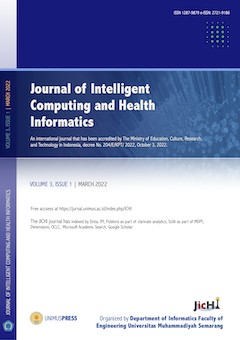- Focus and Scope
- Section Policies
- Peer Review Process
- Open Access Policy
- Archiving
- Publication Frequency
- Type of Article Accepted
- Indexing
- References Management
- Posting Your Article Policy
Focus and Scope
Aims
The Journal of Intelligent Computing and Health Informatics (JICHI) is an international, peer-reviewed medium dedicated to the dissemination of high-quality research at the intersection of Artificial Intelligence, Computational Intelligence, and Biomedical Engineering. The journal aims to bridge the gap between theoretical computing advancements and practical healthcare applications, fostering a dialogue between computer scientists, clinicians, and data analysts. JICHI prioritizes submissions that demonstrate methodological rigor in intelligent algorithms alongside clear, demonstrable implications for clinical practice, public health, or medical systems.
Scope
We invite original research articles, reviews, and technical notes that address complex challenges in the medical and life sciences domains through advanced computing methods. The journal’s scope focuses on, but is not limited to, three core pillars:
Intelligent Computing Methodologies Focusing on the development of novel algorithms with potential applications in biomedicine. Topics include:
- Advanced AI & Machine Learning: Deep learning architectures, reinforcement learning, and explainable AI (XAI) for medical decision-making.
- Computer Vision & Pattern Recognition: Novel techniques in image segmentation, registration, and classification applied to medical imaging.
- Bio-inspired & Evolutionary Computing: Genetic algorithms, swarm intelligence, and neural networks modeled for biological problem-solving.
- Optimization & Complexity: Scheduling, heuristic optimization, and chaos theory applied to biological signal processing or resource allocation in healthcare.
- Health Informatics & Digital Health Systems Focusing on the architecture, implementation, and evaluation of health information technologies. Topics include:
- Clinical & Hospital Information Systems: Electronic Health Records (EHR), interoperability standards (HL7/FHIR), and intelligent clinical decision support systems (CDSS).
- Telehealth & IoT: Wearable sensors, remote patient monitoring, and edge computing for real-time health analytics.
- Medical Diagnostics & Analytics: Automated diagnostic tools, predictive modeling for disease outbreaks, and biostatistical analysis.
- Security & Privacy: Blockchain applications in health data, privacy-preserving data mining, and ethical considerations in medical AI.
- Interdisciplinary Applications Focusing on integrative studies that merge data science with life sciences. Topics include:
- Bioinformatics & Computational Biology: Genomic data analysis, protein structure prediction, and systems biology.
- Health Economics & Policy: Data-driven approaches to health policy analysis, resource management, and technology assessment.
- Human-Centered Healthcare: Integration of behavioral science with AI, user experience (UX) in medical devices, and ICT for health promotion and education.
Section Policies
Articles
Peer Review Process
The JICHI is committed to maintaining the highest standards of academic integrity and scholarly excellence. To achieve this, the journal employs a rigorous double-blind peer review process designed to evaluate the quality, originality, and scientific contribution of submitted manuscripts. In this system, both the reviewers and the authors remain anonymous throughout the evaluation process to ensure objectivity and impartiality in decision making.
1. Initial Editorial Screening
Upon submission, each manuscript undergoes an initial screening by the Editor-in-Chief or a designated editorial member. This preliminary review assesses whether the manuscript aligns with the journal scope and aims, adheres to the submission guidelines, and demonstrates appropriate scholarly rigor and coherence. The editor also evaluates the readability, logical structure, and methodological soundness of the manuscript.
All submissions are checked using Turnitin to detect textual similarity. Manuscripts with a similarity index exceeding 15% will be either rejected or returned to the authors for revision prior to further consideration. This step ensures adherence to ethical publishing practices and prevents academic misconduct.
2. Peer Review Process
Manuscripts that pass the initial screening are forwarded for peer review by two or three independent reviewers who are recognized experts in the relevant field. These reviewers are selected based on their academic qualifications, expertise in the subject area, and absence of conflicts of interest.
Reviewers evaluate the manuscript based on several key criteria including:
- Relevance: The importance of the research question, its alignment with the journal’s Aims and Scope, and its potential contributions to the specific fields of Health Informatics or Intelligent Computing.
- Originality & Novelty: The innovativeness of the research, particularly the extent to which it advances existing knowledge, proposes new algorithms/frameworks, or addresses significant gaps in current literature.
- Literature Review & State-of-the-Art: The completeness and appropriateness of the literature cited. We expect a strong emphasis on primary sources and recent publications (ideally within the last 3-5 years) to ensure the work benchmarks against the current state-of-the-art.
- Methodology & Reproducibility: The robustness, transparency, and validity of the research design. For computational studies, the proposed method or algorithm must be described in sufficient detail to allow for reproducibility.
- Results and Discussion: The clarity, depth, and logical consistency of the findings. Interpretation must be grounded in evidence and compared critically with previous relevant studies.
- Ethical Compliance (Crucial for Health Data): Verification that appropriate ethical standards were followed, especially for studies involving human subjects, patient data, or clinical records.
- Conclusion: The strength and relevance of the conclusions drawn, including clear limitations and implications for future research and practice.
- Language and Presentation: The effectiveness of academic English used, including grammar, logical flow, and correct use of technical terminology.
3. Revision and Re-evaluation
Once reviewer feedback is received, the editorial office communicates the comments and recommendations to the authors. Authors are required to submit a revised manuscript along with a point-by-point response letter addressing each reviewer comment. The editorial team may return the revised manuscript to the original reviewers for a second evaluation to ensure that the revisions meet the required standards.
In some cases, multiple rounds of revision may be necessary before a final decision can be reached. Authors are expected to complete revisions within the timeline specified by the editorial office.
4. Editorial Decision
Following the peer review process, the Editor-in-Chief makes the final decision on the manuscript by taking into account the recommendations from reviewers and the quality of any revisions submitted. The possible outcomes are as follows:
- Reject: The manuscript is unsuitable for publication in the journal and will not be reconsidered.
- Resubmit for Review: The manuscript requires major revisions and may be resubmitted for a new round of peer review.
- Accept with Revisions: The manuscript is accepted conditionally subject to the implementation of minor or major revisions as specified by the reviewers or editors.
- Accept: The manuscript is accepted in its current form and will proceed to the production stage.
The average timeline for the entire review process ranges between 4 and 12 weeks depending on the availability of reviewers and the responsiveness of authors during the revision stages.
5. Ethics and Confidentiality
JICHI adheres to the principles of confidentiality, transparency, and ethical integrity throughout the peer review process. All parties involved including editors, reviewers, and authors are expected to comply with international standards of ethical publishing. Reviewers are required to disclose any potential conflicts of interest and to maintain strict confidentiality regarding the content of the manuscripts they evaluate. In addition, all studies involving human or animal subjects must include documentation of ethical approval from a recognized institutional review board or equivalent authority.
[Last updated: September 12, 2024]
Open Access Policy
This journal provides open access to the full text of all its published articles at no cost to readers or their institutions. Readers are free to read, download, copy, distribute, print, search, or link the full text of all articles in the Journal of Intelligent Computing and Health Informatics (JICHI). This open access approach is based on the belief that making research freely available would support a broader global exchange of knowledge.
Archiving
The Journal of Intelligent Computing and Health Informatics (JICHI) utilizes the LOCKSS and CLOCKSS systems to create a distributed archiving system among participating libraries and permits those libraries to create permanent archives of the journal for purposes of preservation and restoration. Furthermore, JICHI is digitally preserved in the PKP Preservation Network (PKP PN) to ensure long-term access to the scholarly record. URL for LOCKSS Publisher Manifest: https://jurnal.unimus.ac.id/index.php/ICHI/gateway/lockss
Publication Frequency
Journal of Intelligent Computing and Health Informatics is published two times a year (March & September).
Type of Article Accepted
JICHI welcomes high-quality submissions that demonstrate robust validation of proposed ideas through case studies, experiments, or systematic comparisons with existing state-of-the-art approaches. The journal primarily accepts the following article types:
- Original Research Articles Comprehensive reports of original research that make a significant contribution to the field. These manuscripts should discuss new trends, innovative ideas, or specific technical advancements. The content must include a clear methodology, rigorous validation, and in-depth discussion of results.
- Review Articles Critical and constructive analyses of specific research trends or topics. We strongly encourage Systematic Literature Reviews (SLR) following standard guidelines (e.g., PRISMA), although high-quality narrative or traditional reviews providing new insights are also welcomed.
Indexing
Journal of Intelligent Computing and Health Informatics (JICHI), with registered number e-ISSN: 2721-9186, ISSN: 2715-6923. Finally, accepted papers will be freely accessed in this website and the following abstracting & indexing databases:
- CrossRef Search
- GOOGLE Scholar
- Public Knowledge Project (PKP) Index
- BASE Bielefeld search engine
- Electronic Journal Library
- MDPI Scilit
- Dimensions
- GARUDA: Garba Rujukan Digital by Ristekdikti - Indonesia
- Indonesia OneSearch
- SINTA - Science and Technology Index
- SHERPA/RoMEO policy (in progress)
- ROAD ISSN
- EZB Universitat Regensburg
- LOCKSS Archiving system
References Management
Every article submitted to JICHI must use references management software, such as Mendeley and Zotero.
Posting Your Article Policy
Understand JICHI's article sharing and posting policies for each stage of the article life cycle.
Prior to submission to JICHI
Authors may post their article anywhere at any time, including on preprint servers such as arXiv.org. This does not count as a prior publication.
Upon submission to JICHI
Authors may share or post their submitted version of the article (also known as the preprint) in the following ways:
- On the author’s personal website or their employer’s website
- On institutional or funder websites if required
- In the author’s own classroom use
- On Scholarly Collaboration Networks (SCNs) that are signatories to the International Association of Scientific, Technical, and Medical Publishers’ Sharing Principles (https://www.stm-assoc.org/stm-consultations/scn-consultation-2015/)
The following text should be included on the first page of the submitted article when it is first posted in any of the above outlets: “This work has been submitted to JICHI for possible publication".
Upon acceptance to JICHI
If an author previously posted their submitted version of the article in any of the following locations, he or she must replace the submitted version with the accepted version. Authors have 4 (four) weeks to change the status of the article on the repository after acceptance. No other changes may be made to the accepted article.
- Author’s personal website
- Author’s employer’s website
- arXiv.org
- Funder’s repository
Final published article
When the article is published, the posted version should be updated with a full citation to the original JICHI publication, including the DOI. Authors must replace the accepted version with the published article version (Version of Record).
The article will be followed by statements on the JICHI copyright notice. Please also carefully read JICHI's Copyright Notice at: https://jurnal.unimus.ac.id/index.php/ICHI/about/submissions#copyrightNotice








